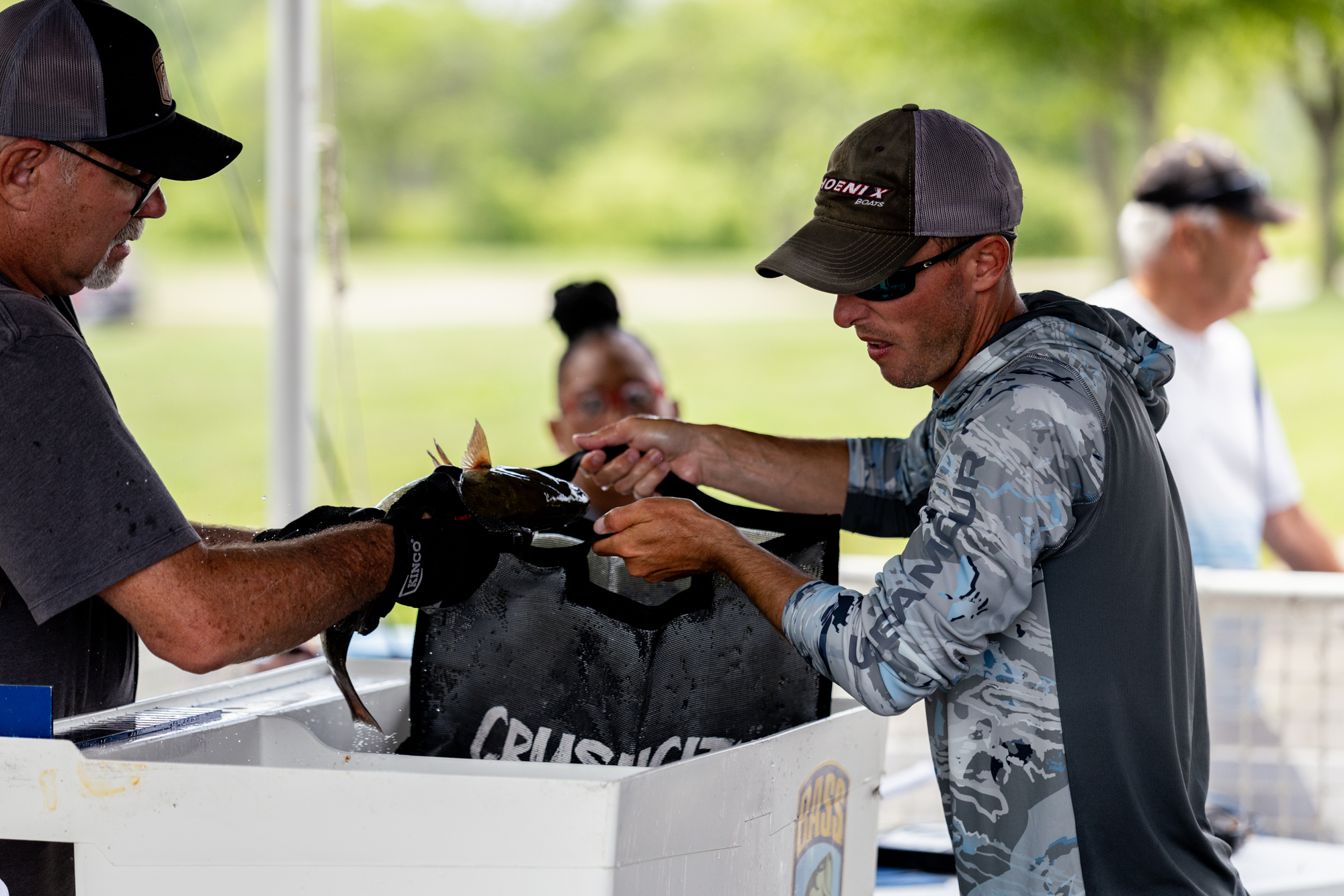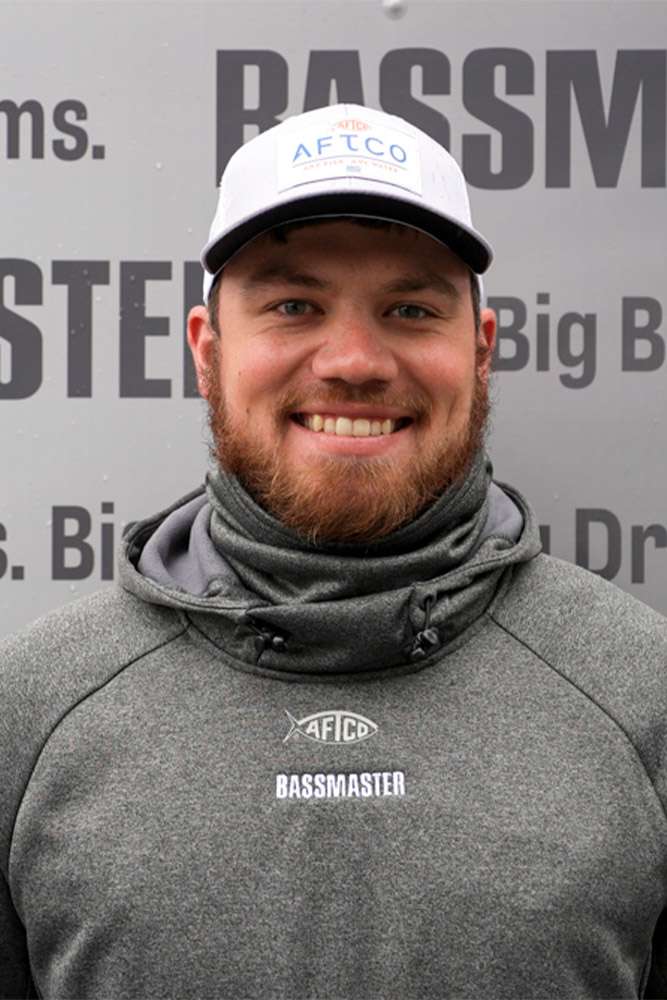
The smallmouth fishing is typically at its best in mid-July around Monroe, Mich. This year, however, the bass are a little behind their normal schedule, according to Garrett Paquette, and it has made the 2025 Mercury B.A.S.S. Nation Qualifier at Lake Erie presented by Lowrance a little more challenging.
“This should be prime time,” Paquette said. “It should be equivalent to the TVA when they start getting to the ledges. But we are just a couple weeks ahead of that. We had a cold spring, and they spawned after Memorial Day, which is insane here.”
The colder than usual spring has delayed migration to summer patterns, with many of the smallmouth still in shallower water recovering from the spawn.
Day 1 weights reflect that. Only four bags of 20 pounds or better hit the scales, although penalties prevented several more from eclipsing that mark. A good chunk of the field brought in limits weighing between 14 and 17 pounds, a result of skinny brown fish.
Wavy conditions also made for a challenging afternoon, no doubt impacting what anglers could do with a rod and reel as well. Day 2 of the tournament was canceled due to forecasted wave heights of 5 to 9 feet.
With both Lake Erie and Lake St. Clair in play this week, Paquette ran to St. Clair to fish the water he is most comfortable with. There, he has seen plenty of smallmouth he believes are trying to transition from their spawning areas to summertime patterns. The mayfly hatch, however, has slowed that transition even more and has kept those smallmouth up in the shallows.
“They are in this weird transition and there have been so many mayflies and bugs and stuff to eat that (the bass) honestly aren’t hungry,” Paquette said. “It is a really fickle time. You see a lot of fish out there, not all the way to their summer stuff and they are hard to catch.”
Paquette caught all of his 19-pound, 2-ounce limit in the first hour of fishing around a group of bass he feels were in a summer pattern, but he noted it’s not the pattern to win the tournament. The bass Paquette needs to win, he could not catch on Day 1.
Meanwhile on Lake Erie, a significantly different fishery in many ways, Allex Conner of Delaware, Ohio, said a similar story is playing out. The cold spring has delayed the seasonal movements on the big lake as well, but that cold spring was followed by a two week stretch of temperatures in the 90s and calm conditions, sending water temperatures above 80 degrees.
On Day 1, Conner focused his efforts on rockpiles in 19 to 26 feet of water and noticed the water temperature was around 77 degrees.
“Some of the fish are full and out, which are the ones I’m catching, and then there are some guys who are catching them shallow,” Conner said. “I think they are starting to move out really fast, though with how warm the water is now. It happened quickly, and there is a lot of bait in the lake right now.”
Battling the conditions
Day 1 started calm, sunny and muggy. The bite was incredible for the first hour for Paquette, first-place Aaron Jagdfeld, second-place Chris Miller and many other anglers. That bite window did not last long, however, as a series of adverse conditions impacted the lakes.
Cloud cover increased throughout the morning ahead of showers and thunderstorm activity, which Jagdfeld believes hurt his bite midmorning.
“This morning, they were eating really well before the front moved through. The sun did poke out and that helped the bite. The smallmouth get off the bottom and you can see them better on forward-facing sonar. As soon as the clouds rolled in, I saw them get closer to the bottom, and they were not feeding as much as they were in the morning.”
The bigger impact, at least in Paquette’s mind, was a shift in wind direction. After the calm start to the morning, the wind began to blow out of the East and Southeast, a less-than-ideal scenario for the former Elite Series pro.
“The biggest thing is the east wind,” he said. “Once the east wind kicked on, it (hurt) the fishing. You went from catching 50 to 60% of the fish you saw to 5%. That is pretty typical out here. The east wind blows against the current and jacks up the system.”
Running around the system proved to be a challenge on Day 1 as well, as both lakes were much rougher than forecasted thanks to the winds from the storms. In a post on social media after weigh-in, Paquette said it was some of the worst waves he’s ever been in during a tournament.
Friday’s forecast calls for northeast, east winds at 5 to 10 mph, which will likely make navigation challenging, although maybe not as challenging as Day 1.
Running to St. Clair
Paquette estimated about 30 boats ran to St. Clair on Day 1, a much lower number than he anticipated after practice. In terms of winning the tournament, St. Clair seems to be providing the right set of ingredients as Jagdfeld and Miller are both fishing in that region. In terms of qualifying for the 2025 Mercury B.A.S.S. Nation Championship at Upper Mississippi River presented by Lowrance, Lake Erie certainly provides the same opportunities.
“In practice there were a ton of people up there, but 20% of them actually went (Day 1),” Paquette said. “It’s not that easy out there, so why run 70 miles to fish for the same bass that are on Lake Erie?
“Hats off to them, it was nasty.”
Green fish not in play
The playing field has plenty of largemouth bass in it too, with some areas having a history of producing 20-pound bags, but not many of them crossed the weigh-in stage on Day 1. With the final-day forecast, will someone gamble and find the right quality largemouth to make a comeback on Friday?





